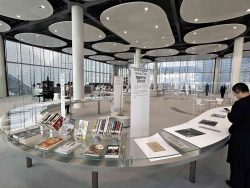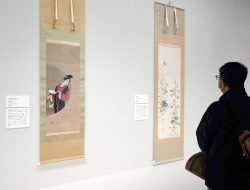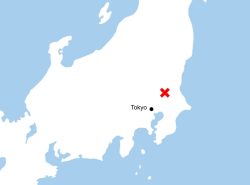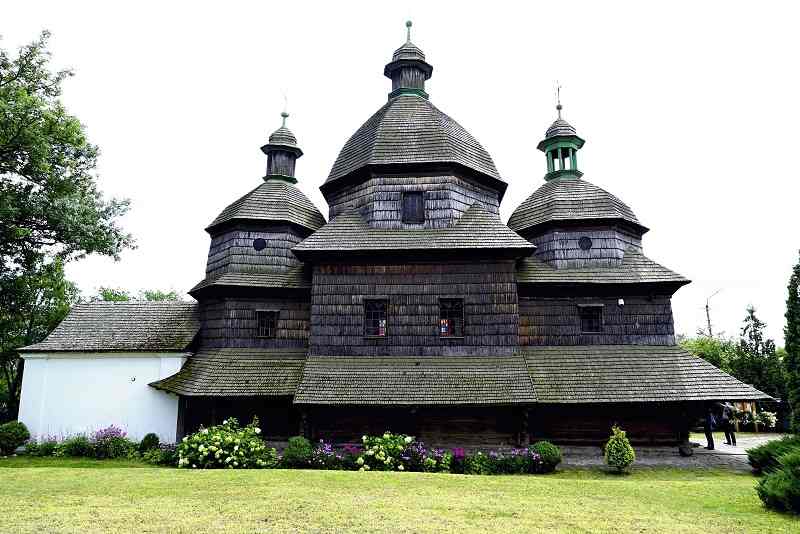
This church building in Zhovkva, Ukraine, is one of a group of wooden churches registered as a World Heritage site. The building is characterized by its octagonal domed roof.
21:24 JST, May 12, 2022
World Heritage sites and other valuable cultural properties in Ukraine are facing a crisis due to Russia’s invasion of the country. There are concerns over physical damage caused by the conflict and also over protection of cultural properties that require specialist knowledge and skills.
Japanese specialists were involved in conservation surveys for some of these properties before the invasion, which began Feb. 24. Providing international support has become even more urgent.
Survey suspended
The development of Ukraine’s unique culture has been influenced by surrounding countries.
The country has seven UNESCO World Heritage sites, six of them listed as cultural sites and one as a natural site, including St. Sophia Cathedral in the capital of Kyiv, and the old town of Lviv in western Ukraine, which was formerly ruled by Poland and the Habsburg dynasty and has many preserved architectural monuments.
A group of wooden churches located in the Carpathian region, which straddles Ukraine and Poland, is also included on the World Heritage List.
University of Tsukuba Prof. Yasufumi Uekita, a specialist in the conservation of architecture, has been engaged in research to help protect the wooden churches dating from the 16th to 19th centuries from deterioration.
Ever since overseas travel was restricted due to the coronavirus crisis, Uekita has consulted online with local researchers and contractors.
A borehole survey had been scheduled to start in February to determine the impact of landslides in the surrounding area on the buildings. It was canceled following the Russian invasion.
Although the conflict has caused no direct damage so far, damage is possible anytime.
Since becoming independent from the Soviet Union, Ukraine has been gaining momentum in the protection of church buildings and training of specialists. Recently, there are growing concerns that if the war is prolonged, there may be disruptions to people learning these skills.
“Securing the safety of the Ukrainian people is the top priority. [But] it is also important to gather information to prepare for the country’s reconstruction and begin discussions on what Japan can do for it,” Uekita said. “I’ll share the information I’ve obtained from local researchers with the organizations concerned.”
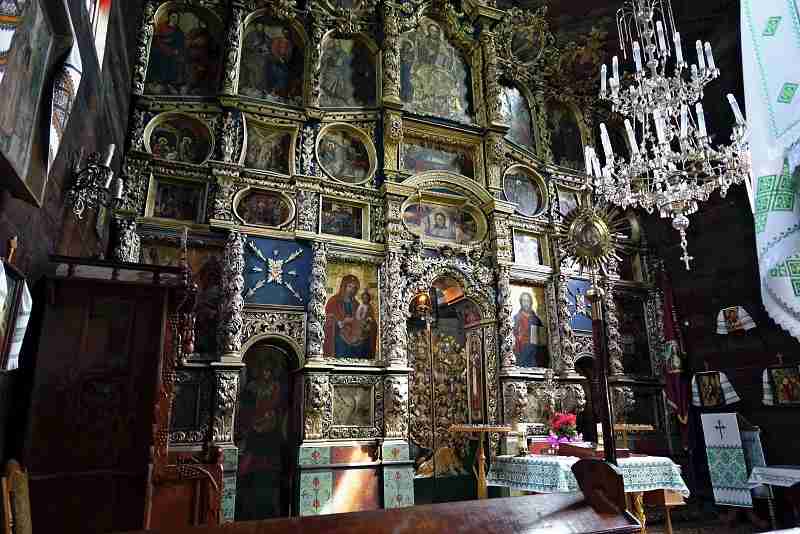
Interior of the church building in Zhovkva
Series of statements
Damage from the Russian invasion has been reported in such places as the historic center of Chernihiv, which is on the tentative list of World Heritage nominations, and in the city of Kharkiv, which has been selected as a member of the UNESCO Creative Cities Network.
UNESCO issued a statement saying that it “condemns all attacks and damage to cultural heritage in all its forms in Ukraine,” in accordance with the Convention for the Protection of Cultural Property in the Event of Armed Conflict (known as the 1954 Hague Convention).
While museums in Lviv and other cities are evacuating artworks, the International Council of Museums (ICOM) has issued a statement that warns, “This crisis will provide an opportunity for unscrupulous individuals to profit from the threats to heritage.”
In accordance with the UNESCO Convention on the Means of Prohibiting and Preventing the Illicit Import, Export and Transfer of Ownership of Cultural Property and other conventions, ICOM reminds national governments of their international legal obligations to protect moveable cultural heritage.
Monitoring with satellites
While there has been a flurry of statements from such organizations, there have also been moves toward providing concrete international support.
The Smithsonian Institution in the United States and other organizations use satellite data to monitor damage to cultural properties, and also offer advice on such matters as how to pack valuable artworks when transporting them.
Kenichiro Hidaka, a University of Tsukuba professor emeritus specializing in World Heritage-related issues, emphasizes the importance of “heritage watch,” which involves collecting data beyond national borders on endangered cultural heritage.
Hidaka said, “It’s desirable to establish a global network for cultural heritage protection with the participation of Japanese specialists.”
Both the public and private sectors in Japan have been contributing to preserving and restoring cultural heritage damaged by wars and civil wars, such as the Angkor monuments in Cambodia and the Bamiyan Valley in Afghanistan. Japan has also been helping to develop human resources, building a track record in the field.
While it is hoped that Ukraine will not be further ravaged by conflict, specialists have an eye on the future as they find ways to cooperate in protecting its cultural heritage, which is a historical symbol of the country.
"Culture" POPULAR ARTICLE
-
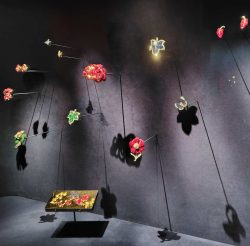
Van Cleef & Arpels Dazzles with Art Deco Artisanry at Tokyo Exhibit
-

Disney’s ‘Twisted-Wonderland’ Animated Series Puts Villains in Spotlight: New Show Features School Inspired by Classic Disney Films
-

Japan Plans to Distribute Manga Overseas Via New Platform
-

Ayumi Hamasaki’s Shanghai Concert Canceled Day Before Schedule as Part of Beijing Backlash
-

‘The World Masterpiece Theater Series’ Celebrates 50 Years; Animator Looks Back on Creating Anime Classics
JN ACCESS RANKING
-

Keidanren Chairman Yoshinobu Tsutsui Visits Kashiwazaki-Kariwa Nuclear Power Plant; Inspects New Emergency Safety System
-

Imports of Rare Earths from China Facing Delays, May Be Caused by Deterioration of Japan-China Relations
-

University of Tokyo Professor Discusses Japanese Economic Security in Interview Ahead of Forum
-

Japan Pulls out of Vietnam Nuclear Project, Complicating Hanoi’s Power Plans
-

Govt Aims to Expand NISA Program Lineup, Abolish Age Restriction


